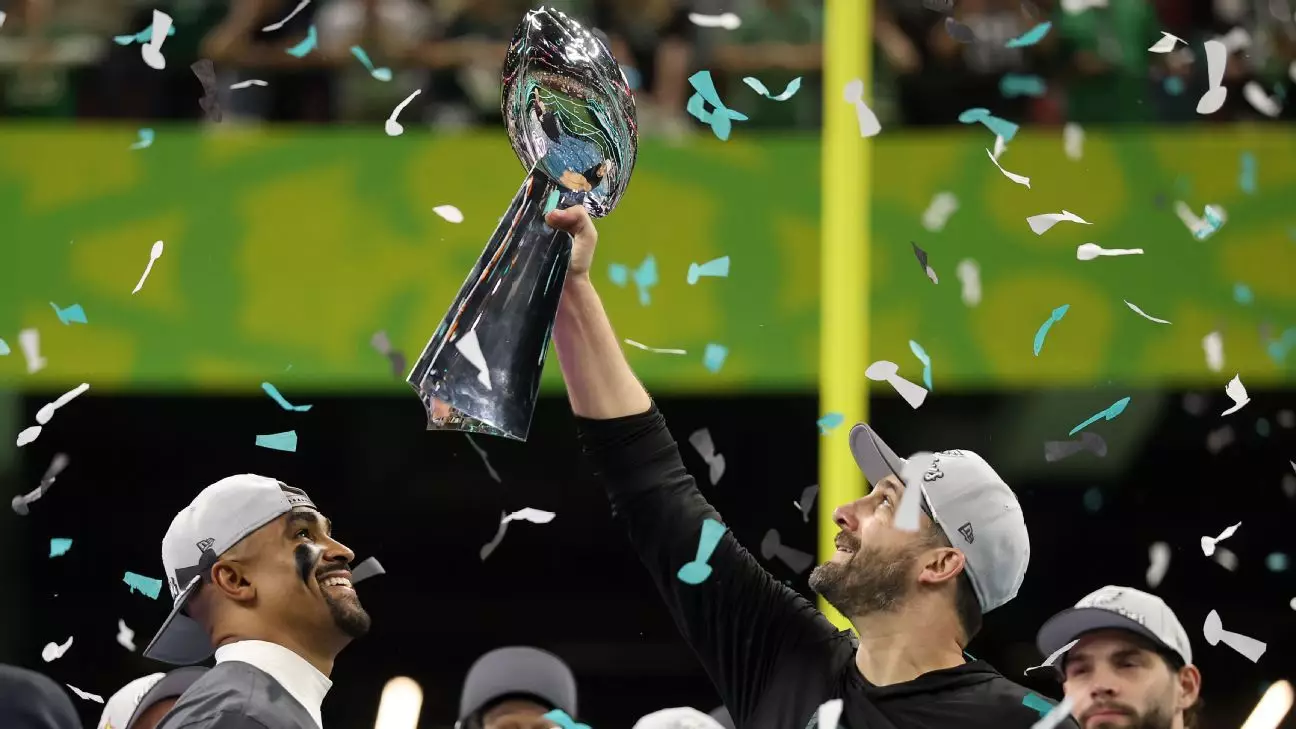In a decisive and pivotal maneuver, the Philadelphia Eagles have appointed Kevin Patullo as their new offensive coordinator, stepping up from his previous role as passing game coordinator and associate head coach. This strategic internal promotion comes in the wake of Kellen Moore’s departure to lead the New Orleans Saints, marking what could potentially be a watershed moment for the Eagles as they seek to maintain team continuity and excellence going into the next season.
Continued success in the NFL heavily relies on effective coaching strategies and cohesive team dynamics. By promoting Patullo, the Eagles are reinforcing their commitment to stability within their coaching staff. The 43-year-old Patullo brings a wealth of experience and familiarity, particularly as he has been closely linked with head coach Nick Sirianni since their tenure together in Indianapolis. Patullo’s ability to understand and communicate Sirianni’s offensive philosophy positions him as an ideal candidate to lead the Eagles’ offensive strategies moving forward.
Sirianni’s confidence in Patullo underscores the supportive relationship cultivated over the last eight years. As Sirianni noted, Patullo has been instrumental in decision-making processes and offensive play designing, showcasing the integral role he plays in the coaching hierarchy. This familiarity may help bridge the gaps that often come with coaching transitions, especially during a period of heightened expectations following a Super Bowl appearance.
However, with Patullo’s promotion comes a noteworthy challenge for quarterback Jalen Hurts. As he enters his fourth season, Hurts will now work with his fifth different offensive playcaller. While there has been an effort to foster familiarity between Patullo and Hurts, the revolving door of coordinators could impact Hurts’ development and performance. This context adds pressure to the new role Patullo is assuming; ensuring Hurts receives the guidance and tactical structure necessary for growth will be paramount.
Despite these challenges, Hurts has expressed optimism about Patullo’s leadership. His remarks reflect an understanding of the larger dynamics at play, with the quarterback focusing on honing his skills regardless of external changes. Hurts’ proactive mindset is critical; it positions him to adapt and excel, even when faced with the adjustments that come from a new coaching perspective.
The decision to promote Patullo also brings a cautionary tale rooted in the Eagles’ recent history. The last instance of an in-house promotion — Brian Johnson — was fraught with difficulties. Johnson’s ascendancy to the role was overshadowed by inconsistencies in offensive identity, ultimately impacting the team’s performance towards the end of the season. Such outcomes necessarily inform the Eagles’ current strategy, as implementing a clear offensive identity remains crucial to their overarching success.
The experience teaches an important lesson about aligning visions among the coaching staff. The failure of Johnson to connect with Sirianni’s goals and Hurts’ capabilities emphasizes the need for harmony within the offensive structure, a lesson that will likely guide Patullo as he carves out his offensive philosophy.
As the Eagles transition into a new chapter with Kevin Patullo at the helm of their offense, expectations among fans and analysts alike are indubitably high. The continuity he offers and his previous rapport with Jalen Hurts will be significant factors in how effectively the Eagles can integrate their offensive strategies this coming season. The team not only seeks to build on the momentum of its Super Bowl run but must also address the challenges brought on by changes in leadership.
Ultimately, the Eagles’ decision to elevate Patullo signifies their understanding of the importance of chemistry and familiarity within their coaching staff. As he embarks on this new role, both the coaching staff and players will need to rally around their shared goals and work collaboratively to ensure they remain contenders in a fiercely competitive league. The upcoming season will reveal whether this internal promotion serves as a catalyst for sustained success or if it leads to questions about continuity amid change.

